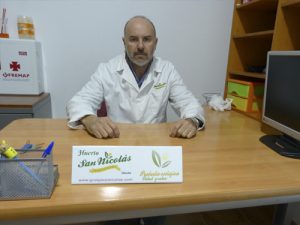The San Nicolás pantry is a wholesaler for agricultural producers from various Spanish provinces (Jaén, Córdoba, Granada,) and it also includes a producer from the Canary Islands. The producers have collaborated and co-operated together in order to sell and distribute their products, which are certified as organic, directly to the market at various locations in Jaén and its immediate hinterland; and indirectly through intermediaries.
Area: They are small or medium-sized producers, similar to traditional gardeners, with plots ranging from 500 to 3000 meters. The size is dependent on the area in which they are located; and accessibility to water.
La Despensa de San Nicolás commenced its operation in 2011, with the conversion of a traditional olive grove into an organic site. In 2014, the farm diversified into the rearing of organic poultry production. The farm and olive grove is situated on a relatively small holding of approximately 3.2 ha. The basket of organic products commenced from 2016 onwards, where the enterprise started selling organic eggs to consumers. There was excellent feedback and customers asked for other organic products to be included in the basket So through consumer demand, the enter- prise looked for different producers. The enterprise has continued to expand their offering. Furthermore, the company has an isothermal vehicle suitable for the transport of all products in hot weather.
In 2016 the basket of organic products was introduced due to customer demand. Initiually it was organic eggs from the farm but customers also wanted other organic products. The main objective of San Nicolás pantry is to provide consumers a wide variety of healthy and organic products; and to provide a service which encompasees peripheral lcoations.
Overall, 70% of products originate from an association of producers in Granada, which includes the Valle de Lecrín, tropical zone of Almuñecar, Salobreña and Motril and a portion of Sierra Nevada to Lanjarón. In Granada, producers have a warehouse where they meet to manage and process orders. It is situated in this location as it very accessi- ble to numerous producers in the provinces of Granada, Almería and Jaén. In the remaining provinces, the manager goes directly to visit each producer and buys the relevant commodities from the farmer. In Córdoba, on the subbetic side, there are potato producers. The bananas come from an organic producer located on the Canary Islands. In the province of Jaén there are producers of mushrooms (shitake mushrooms, portobello mushrooms), goat cheese (with oregano, mint, oil, etc). Other products included in the basket are: potatoes, sweet potatoes, leeks, tomatoes, Swiss chard, strawberries, kiwi, orange, mango, asparagus, apple, onions, pumpkins, etc. It is planned in the foresee- able future to include an ecological / organic cosmetic line, made with organic olive oil and aromas of natural herbs. The products are certified by Sohiscert. The enterpise has also opened an office in Úbeda (the main headquarters are located in Seville). The enterpise alos employs a Sohiscert technician who collaborates with the producers so that they comply with the traceability of the product.
The San Nicolás pantry has commenced taking orders via WhatsApp and email. A list is sent to consumer groups and organic stores, with the products available on a particular week and they are provided to the customer on the following week. The customer is able to trace the lifecycle of the relevant product (who certifies it and who produces it). The company wishes to speed up the ordering process; and to increase the number of customers.
Currently the company is developing an ambitious marketing and communication strategy, insofar as it wants to extend to other European markets and eventually to countries situtaed in South America. The San Nicolás pantry has developed an excellent catalog, which outlines all the products which can be purchased from the company.
Since 2011, the company has noticed a growing demand by customers for organic products but it is also aware that Spain is lagging behind many other European countries. Prominent examples include: Germany, France, Switzerland, Denmark.
Another objective of the enterprise is to promote social inclusion. It has hired a person with a disability, an individual who find it difficult to gain meaningful employment in the traditional labour market. This person is responsible for traceability.
The company is part-financed through the FEDER programme; and Adlas – a the rural development group.
One of the biggest challenges is bureacracy. According to the respondent there are: ‚Too many demands and a lot of very standardized regulations that do not fit the ecological cultivation.‘
In regards to the producers it has no problems ‚there has always been good understanding and they have organized and coordinated with San Nicolás pantry from the beginning‘. The biggest diffculty is finding competent dispatchers to transport the products. The company has hired several people and they have not been able to do the job correctly, so San Nicolás pantry is currently providieng a training programme so this problem can be rectified. As there is more and more demand for organic products, the company starts to see training courses in trade schools.
Advice/Recommendation
"When working with food, traceability is a fundamental requirement, to know who produces those products, which organisation certifies them as organic and where they are distributed. In the case of organic eggs, we use a template where all the data required to comply with traceability regulations and this avoids possible problems that may arise and even sanctions."
"It is very important to be convinced of what you are doing and be aware. If someone starts a type of activity like this, just because they have a profitable business, it will not work out."
"The administration in general, is not prepared for this type of projects. They lack a lot of information and work in the field, so before starting an activity like this, be well prepared, take advantage of all the options of related courses that can be presented to new entrepreneurs , attend talks, conferences, check closely how a consumer group works."
Queries/Questions
- Do you think consumer groups are the best way of selling organic products?
- Do you think that this type of collaboration between producers in your country is possible?



 Čeština
Čeština  English
English  Français
Français  Deutsch
Deutsch  Italiano
Italiano  Slovenščina
Slovenščina  Español
Español 






